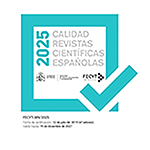Política escatológica y economía salvífica en el cristianismo medieval: evasiones en la genealogía foucaultiana de la gubernamentalidad
Resumen
Este artículo analiza la dimensión escatológica en la constitución del pastorado eclesiástico plenomedieval en un diálogo con la analítica del poder de Michel Foucault. Para ello se examina la especificidad medieval de la economía de salvación y la política escatológica de la Iglesia romana y de los movimientos de resistencia que surgen en sus márgenes. En paralelo al estudio histórico, se reflexiona sobre las caracterizaciones del pastorado eclesiástico medieval que ofrece Foucault en la genealogía de la gubernamentalidad. Finamente, se argumenta que la temporalidad escatológica que inaugura el cristianismo condiciona la forma de dominación juridizada y pastoral que adopta la Iglesia. Esta dualidad gubernativa, que culmina en el periodo medieval con la aspiración a una potestad absolutista, se manifestará de forma especialmente patente en la política de persecución de la herejía.
Descargas
Descarga artículo
Licencia
La revista Res Publica. Revista de Historia de las Ideas Políticas, para fomentar el intercambio global del conocimiento, facilita el acceso sin restricciones a sus contenidos desde el momento de su publicación en la presente edición electrónica, y por eso es una revista de acceso abierto. Los originales publicados en esta revista son propiedad de la Universidad Complutense de Madrid y es obligatorio citar su procedencia en cualquier reproducción total o parcial. Todos los contenidos se distribuyen bajo una licencia de uso y distribución Creative Commons Reconocimiento 4.0 (CC BY 4.0). Esta circunstancia ha de hacerse constar expresamente de esta forma cuando sea necesario. Puede consultar la versión informativa y el texto legal de la licencia.









